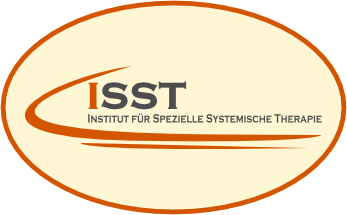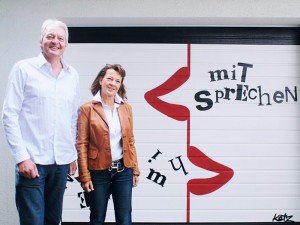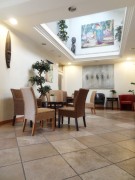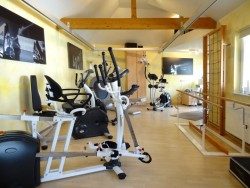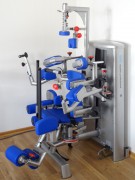Highly Professional Expertise Focused on our Patients
The company philosophy of ISST is to supply patients with comprehensive, customized therapies and adapting the therapeutical possibilities through stringent quality standards to achieve the best possible treatment result: More quality of life for the patient! Patients and therapists are partners in personalized therapy.
Establishment of ISST
The Institute for Special Systemic Therapy (ISST) – International Center for Rehabilitation was founded by Dr. Klaus and Sabine Berndsen in Unna, Germany in 1984. Since that time, they have accumulated expertise, which allows them to competently advise, diagnosis, treat and handle patients fairly. The ISST defines its purpose as a competent provider of therapies to promote and rehabilitate the health of its patients. Our institute concentrates its rehabilitation services in the areas of language, speech, motion, cognition, nerve function, pain, hearing deficits, vertigo and sleep disorders such as snoring and sleep apnea.
Since ISST’s beginnings, the institute has been involved in intensive concerted research with universities hospitals, rehabilitation facilities and international specialists to continually develop new efficacious treatment methods and assistive technologies to aid ill and andicapped individuals. Today ISST represents an innovative team of therapists, who have a competent and modern scientific understanding of diagnosis, therapy and special individual forms of rehabilitation.
New research ideas are often realized through practical work, which Dr. Klaus and Sabine Berndsen experience with their patients. The development of new therapy methods and assistive technologies emerge primarily through patient contact. In many cases, their developments have emerged from the critical analyses of current theories and treatment methods which required much needed revisions. Some of their methods and devices have been issued patents. Many of their developments are used currently by physicians and therapists worldwide.
Creativity and Personal Experience as Stimulation for New Developments
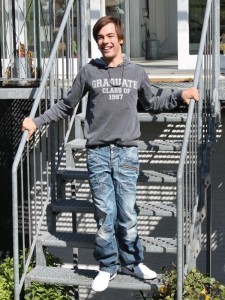 At the beginning of every new development, there is always the necessity moskitoto provide specific aids for a special patient. This happened in 1991 when son of Dr. Klaus and Sabine Berndsen was born with cerebral palsy (CP). As afflicted parents, the Berndsens wanted to do everything possible to limit the extent of the handicap. Over the years, they visited physicians and therapists in Germany and abroad, including trips that took them for weeks at a time to the Ukraine, USA, South America, Hungary, Poland and as far as China. Unfortunately, only slight improvements were seen in their son’s condition and their wish that he would be able to learn to walk did not materilize over the years.
At the beginning of every new development, there is always the necessity moskitoto provide specific aids for a special patient. This happened in 1991 when son of Dr. Klaus and Sabine Berndsen was born with cerebral palsy (CP). As afflicted parents, the Berndsens wanted to do everything possible to limit the extent of the handicap. Over the years, they visited physicians and therapists in Germany and abroad, including trips that took them for weeks at a time to the Ukraine, USA, South America, Hungary, Poland and as far as China. Unfortunately, only slight improvements were seen in their son’s condition and their wish that he would be able to learn to walk did not materilize over the years.
Because both parents possessed a comprehensive therapeutic understanding and could complement this experience through the variety of international expert findings, they began to develop their own improved methods and equipment, which they applied to their patients and their own son. In fact many who were afflicted, including their son, were able to gradually improve their movements and even learn to stand and walk. All assistive techniques and equipment are continually refined and have been developed into a highly individualized treatment methods. At ISST, patients from all over the world are treated with these methods.
Self-Development of Medical Equipment

Generally, industry neglects products, which have minimal demand, resulting in an unprofitable product. Dr. Klaus and Sabine Berndsen began arduously to build the urgently needed assistive devices during evenings in their own workshop. These devices were mainly built for a particular patient and were made available to the patient either free of cost or charged only for the material cost. New legal regulations bound to extensive and expensive testing procedures of the products made the creative venture increasingly more difficult to maintain. For a variety of assistive technologies, the inventors were awarded patents for their work.
Scientific Publication and Publicity
Concerning the application of their inventions, new forms of therapy, technologies and research results, Berndsen/Berndsen publish this information in books and professional journals. Television, radio and print media report repeatedly about their new therapeutic methods and technological developments.
Univesity Seminars, Professional Training for Physicians and Therapists
Besides their therapeutic work at ISST, Dr. Klaus and Sabine Berndsen teach seminars at different universities in Germany and abroad and are active clinical work. In the framework of these responsibilities, they guide research and supervise the scientific development.
Dr. Klaus and Sabine Berndsen regularly instruct vocational and professional trainings for physicians and therapists in their own and in differing worldwide facilities, at congresses, etc. Thereby, the focus is on scientific involvement and practical implementation of the therapeutic methods and technical applications which Berndsen/Berndsen developed at ISST in Unna.
Facilities at the Institute for Special Systemic Therapy
The therapies at ISST are supported through modern assistive technologies. For diagnosis and treatment, rooms for single or group treatments, training and rehabiltation rooms with technical equipment, modern instrumentation, a nap room and outside therapy possibilities.
Employees at ISST
To ensure trusted, personable contact between patient and therapist, the ISST is organized in spatial, staff manageable and familial structure. The ISST therapists are required to have a university degree (Master’s) in the area of rehabilitation and thereafter to obtain technical specialization at ISST which last several years. The therapists are distinguished by their high level of technical expertise and social intelligence.
